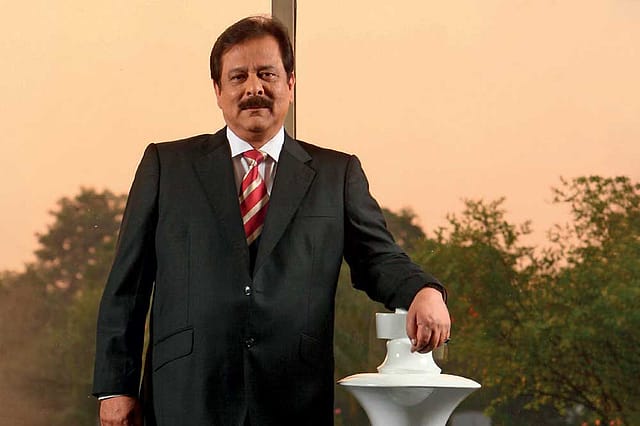Subrata Roy (1948-2023): The Maverick

SUBRATA ROY'S SET UP didn't just comprise a fund that promised more than any other around, he also presented a larger-than-life figure of himself and his company, calling the latter a family (Sahara India Pariwar) and himself Saharasri, the firm's chief managing worker. And his customers, upon which the business empire was built, didn't consist of the wealthy, but millions of the country's illiterate and poor.
Roy, who had disappeared from public view in the last few years as his troubles mounted, died recently from a cardiac arrest.
What made Roy, who built a multibillion-dollar enterprise whose interests ranged from finance and housing, to aviation, media and hospitality, so fascinating was that he started with nothing. Born in Gorakhpur in eastern Uttar Pradesh, his father was a minor official at a sugarcane mill. He had tried various small enterprises in his youth, most of which had failed. At one point, it is said, he even sold salted snacks. Then, in 1978, borrowing his father's Lambretta scooter, a capital of ₹2,000, and hiring a peon and a clerk, Roy who was about 30 years old, began to seek out depositors for a fund. This was the beginning of Sahara. Its funds—which have been described as ponzi schemes, where investors got their returns so long as new investors kept coming in—were alluring because they tapped into the underclass of the poor and illiterate who were still out of the banking network.
By the 1990s, and stretching right up to the early part of the 2010s when his troubles began, Roy had built one of the country's biggest business conglomerates. His group employed more than a million individuals, second to only the Indian Railways, it was said, in providing the most jobs in the country. Apart from his many businesses, he sponsored the Indian cricket team, bought an IPL team (Pune Warriors India), owned a stake in a Formula One racing team (Force India), and also owned New York's landmark Plaza Hotel and London's iconic Grosvenor House. He hobnobbed with the elite. And he threw what is still considered the most expensive Indian wedding party for his two sons in 2004.
Imran Khan: Pakistan’s Prisoner
27 Feb 2026 - Vol 04 | Issue 60
The descent and despair of Imran Khan
At the centre of this mystique stood the figure of Roy. He lived in a city within a city, a vast estate in Lucknow that he called Sahara Shahar, and which, among other things, had an artificial lake and its own petrol station. He devised a new greeting for the group (the Sahara Pranam, where workers put their right hands to their chests), and he once organised a rally where an estimated 1.1 million Sahara employees sang the national anthem.
The company's troubles began from 2009 onwards, when one of its arms, Sahara Prime City, applied for an initial public offering. Some of the disclosures made SEBI (Securities and Exchange Board of India) suspicious, and inquiries soon snowballed into a massive investigation. Far from retreating, Roy went on the offensive. He took out advertisements in major newspapers criticising regulators. In 2012, when he was asked to provide the identities of the group's customers, he sent a convoy of 127 trucks with over 30,000 cartons of chaotically ordered documents. Eventually, Roy was jailed a few times, and then granted parole later.
Sahara's finances however continue to remain a mystery. After the Supreme Court directed Sahara to refund its depositors (about ₹25,163 crore), SEBI had set up a cell to handle these claims. However, according to SEBI's annual report, it has received less than 20,000 applications, with over 17,000 of them being refunded about just ₹138 crore. What explains the rest of the money? One theory is that Sahara's customers may have been partly fictitious—a front for politicians' cash or for undeclared income.
With Roy's death, it is a mystery that will likely never be resolved.
